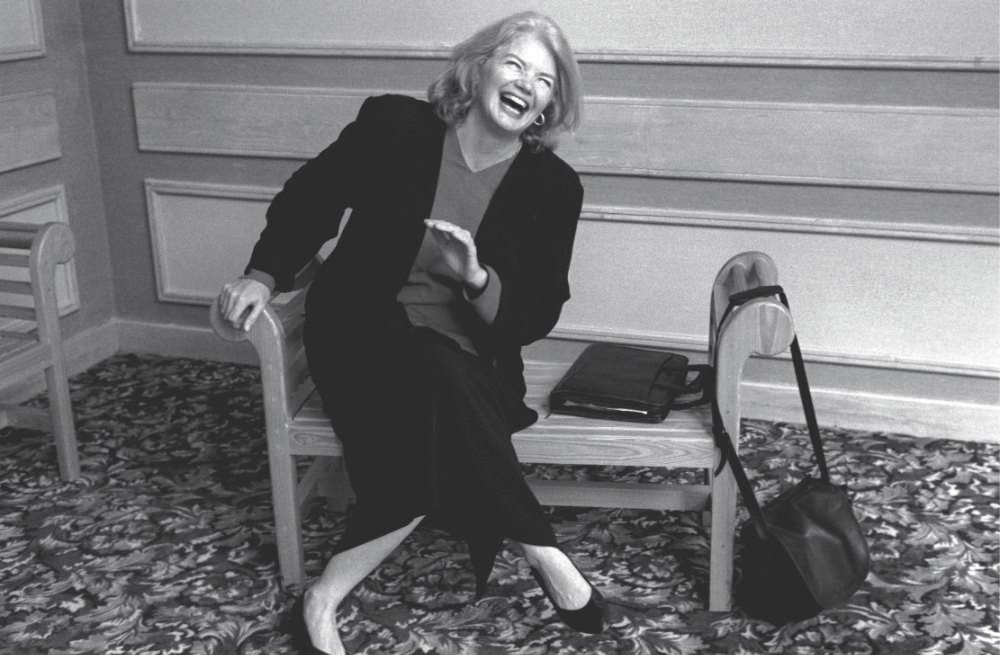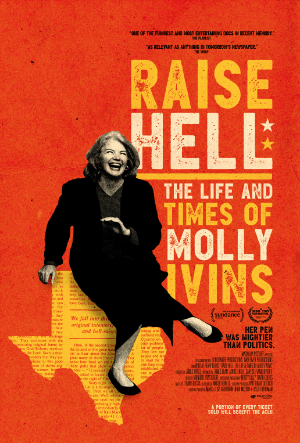
Molly Ivins was a soothsayer. The acid-tongued journalist, who died in 2007, famously documented—and satirized—the circus of Texan politics. (Decades before “Florida Man” became a meme, Texas was the joke of the era. Norwegians have actually come to use the word texas as slang for ridiculous or bonkers.) Ivins’ mission was to harpoon the legislative lunkheads who tangled up her Great State, and she took immense pleasure in impaling the most regressive of the bunch. Ultimately, she foretold the chaotic patterns of the current administration. Her wit is her legacy. When a Dallas congressman suggested that a fuel shortage could be avoided if schools ended desegregation, Ivins quipped, “If his I.Q. slips any lower, we’ll have to water him twice a day.”

Raise Hell: The Life & Times of Molly Ivins
Produced by James Egan ’72
Magnolia Pictures
Raise Hell: The Life & Times of Molly Ivins effervescently pays homage to this groundbreaking raconteur, chronicling her life from her strained childhood to her early death from cancer. Directed by Janice Engel and produced by James Egan ’72, this energetic feature-length documentary is laugh-out-loud funny. Not because of anything inherently uproarious about its framing, but because it allows Ivins to speak for herself. I frequently found myself chuckling at the archival footage of her talks and interviews, listening to her lob dart after dart and wishing she were still alive today to defend the American republic. Her words are clean and pointed, and you instantly fall for her warm Texan intonations.
The film assembles a rich, intimate mosaic from these recordings and talking-head interviews with Ivins’ friends, family and admirers. They describe a larger-than-life personality who grew from a bookish child who retreated into her stacks to escape an authoritarian patriarch. (Even Ivins, an out-and-proud liberal, admits that her progressivism began as teenage rebellion against her oilman father’s Good Ole politics.) She attended Smith College as a misfit among blue-bloods, a brassy 6-foot-tall Southern gal who possessed a voice that couldn’t be tamped down. (Later, as a reporter for The New York Times, prim editors balked when she succinctly described a chicken slaughter as a “gang-pluck.”)
As a syndicated columnist and author of almost a dozen books, Ivins rallied for democracy and indicted cronyism. Loved ones define her as clever and loyal, a nonconformist who named her dog “Shit” and drank too much. While the producers veer somewhat into hagiography—it would have served the narrative to feature people who didn’t love Ivins and who were perhaps even on the receiving end of her barbs—interviewees are candid about her alcoholism and other emotional barriers. The film would make an excellent prelude to a TV series inspired by Ivins’ life. Think Designing Women-meets-Marvelous Mrs. Maisel: a retro-feminist comedy about a big-mouthed Texan journalist raining hellfire on the criminally two-faced.
This film expertly distills Ivins’ charisma and makes you nostalgic for the heyday of journalism, long before tech helped mangle the industry. I wonder what Ivins would say about that.
Bahr is a film and TV critic whose work has appeared in the Hollywood Reporter, Washington Post, Village Voice and other publications.
Robert Bedell/Courtesy Magnolia Pictures